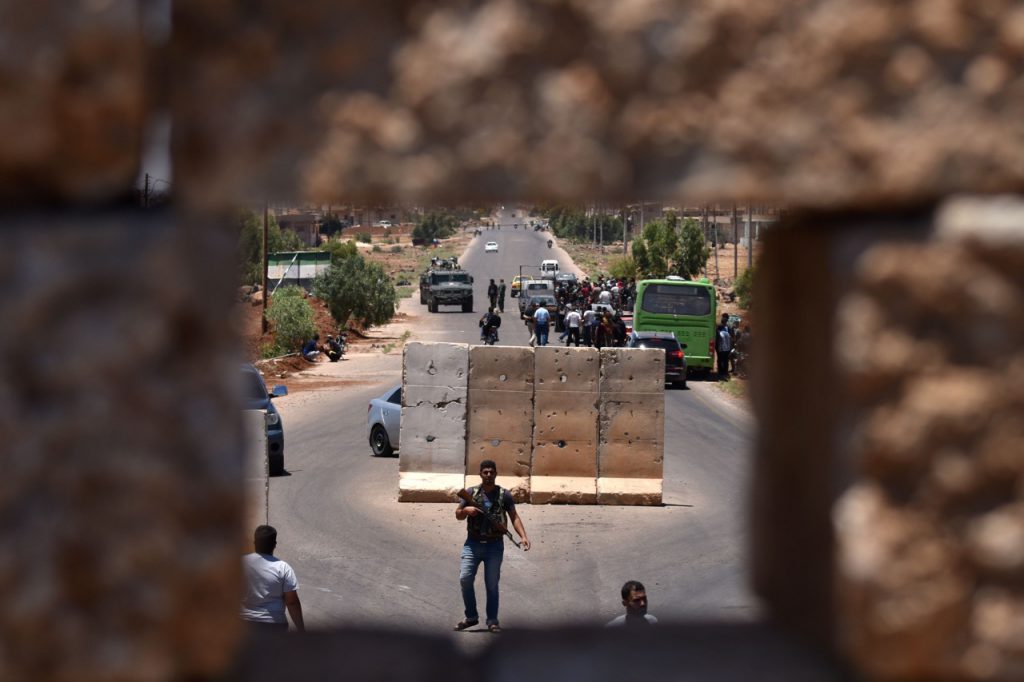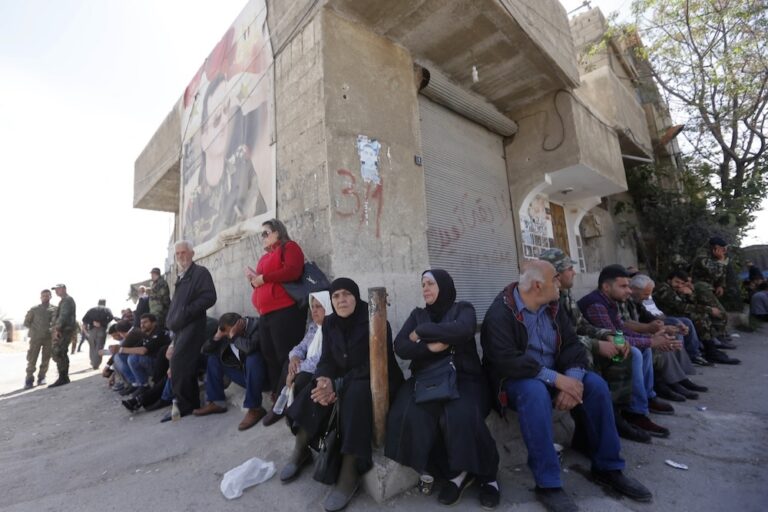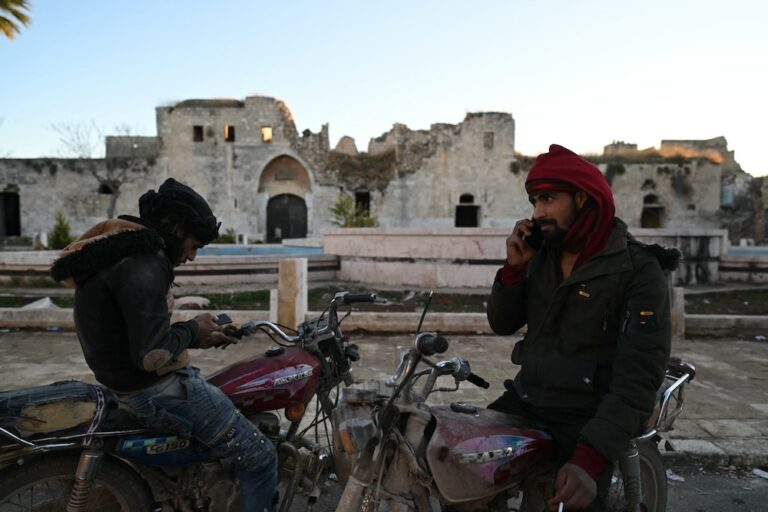Active combat has ended in much of Syria, but nothing has changed in the way intelligence branches trample rights of perceived opponents of Assad’s rule.
This statement was originally published on hrw.org on 21 May 2019.
Human Rights Watch has documented 11 cases of arbitrary detention and disappearance in Daraa, Eastern Ghouta, and southern Damascus. The government retook these areas from anti-government groups between February and August 2018. In all cases, the people targeted – former armed and political opposition leaders, media activists, aid workers, defectors, and family members of activists and former anti-government fighters – had signed reconciliation agreements with the government. Local organizations, including Syrians for Truth and Justice and the Office of Daraa Martyrs, have documented at least 500 arrests in these areas since August.
“Active combat has ended in much of Syria, but nothing has changed in the way intelligence branches trample rights of perceived opponents of Assad’s rule,” said Lama Fakih, acting Middle East director at Human Rights Watch. “Lack of due process, arbitrary arrests, and harassment, even in so-called reconciled areas, speak louder than empty government promises of return, reform, and reconciliation.”
Human Rights Watch interviewed 16 former residents of Daraa and Quneitra governorates, Eastern Ghouta, and towns in southern Damascus. They said that Syrian intelligence branches have detained and harassed people related to anti-government activists or former fighters, along with defectors, members of anti-government groups, or activists. Humanitarian workers, community leaders, and media activists who remained in government-held areas were also detained and harassed. People have been arrested in their homes and offices, at checkpoints and in the streets, relatives and witnesses said.
The locations include Da’el, Ibtta’, Naua, al-Yadudeh, and Etaman in Daraa governorate; a town in Quneitra governorate whose name is withheld due to concerns about reprisals; Douma in Eastern Ghouta; and Babila in southern Damascus. Residents said, based on checkpoints and personnel conducting raids, that Da’el and Ibtta’ are under the control of Air Force Intelligence, while al-Yadudeh and Etaman are under the control of Military Intelligence.
In southern Damascus, the Military Intelligence Patrols Branch arrested people and transferred them to the Palestine Branch, also operating under Military Intelligence. Human Rights Watch could not ascertain which intelligence branch was responsible for detentions in Ghouta.
Most of those detained were apparently never charged. In three cases, intelligence branches apparently arrested people because someone filed a complaint against them. In the majority of cases, people were held incommunicado either throughout or for part of their detention and denied access to a lawyer. The authorities did not inform their families of their whereabouts or take them promptly before a judge, as far as their relatives and colleagues could tell. In one case, a detainee told friends that military intelligence beat them before taking them to military court, even though they were arrested in a civil suit.
In at least one case, authorities transferred the person to Sadnaya prison, which is known for torture and extrajudicial executions. In three cases, relatives were detained and/or harassed by intelligence branch members to gain information about their wanted family member or to force that family member to return.
Relatives and friends of detained people said they were released only after their families paid a bribe and, in some of the cases, asked high level members of the reconciliation committees or Russian military police to intervene. One person interviewed said he got a relative released after reaching out to the Russian military police. Two others said they brokered the release of relatives through the Fifth Corps, an affiliated militia. In at least two other cases, relatives said they tried to reach the Russian military police or the local reconciliation committees but failed.
Interviewees said the Russian government’s ability to help depended on the area where the person was arrested and whether the person asking was an important community leader or had connections. In two other cases, former residents said, protests in the town where the detained person lived led to their release.
The Syrian government should immediately release all arbitrarily held detainees, or if there are valid grounds for holding them, make those clear. The authorities should present detainees to a judge within 48 hours of their arrest, provide them with access to a lawyer, and inform their families of their whereabouts.
Russia should use its influence with its ally Syria to stop arbitrary detention and harassment, Human Rights Watch said. Russia should expand its ad hoc intervention to release arbitrarily held detainees and information regarding those disappeared. Russia should also support the work of impartial international organizations to gather information on the whereabouts of disappeared people, monitor detention sites, and facilitate communications with families. Russia should press the Syrian government to cooperate fully with these organizations to ensure they have full access to formal and informal detention centers.
Local reconciliation committees should continue to monitor and address arbitrary detention, harassment, and disappearance and raise individual cases with the Russian military police, the Syrian government. Impartial international organizations working on these issues should provide support to the local committees.
Despite the ongoing threats of persecution in areas held by the Syrian government, countries hosting refugees, including Lebanon, Denmark, and Germany, are under domestic political pressure to encourage returns. In some cases, countries have actively organized returns, created incentives for refugees to return, made conditions in host countries increasingly inhospitable, and even deported refugees back to Syria.
“Those who tell you there is stability or security in the south are lying,” a humanitarian worker from Daraa told Human Rights Watch. “There are still assassinations and arbitrary detentions, and the residents continue to suffer persecution.”
The United Nations Refugee Agency (UNHCR) has called on all governments not to forcibly return anyone to Syria.
“Nowhere is the effect of an absence of protection guarantees starker than in areas re-taken by the government,” Fakih said. “The harassment and abuse by intelligence branches is a major deterrent for people considering return and has forced out people who wish to remain. If Russia is serious about encouraging refugee returns, it should pressure the government to end detention abuses and create conditions conducive to a safe and dignified return.”
Applicable International Law
Under international law, detention is arbitrary when the detaining authority violates basic rights of due process, including for a prompt hearing before a judge. Principle 11 of the UN Body of Principles for the Protection of All Persons under Any Form of Detention or Imprisonment states that a detainee must be “given an effective opportunity to be heard promptly by a judicial or other authority,” and that a judicial or other authority should be empowered to review the decision to continue detention.
Extended detention without charge or trial or without an appearance before a judge is arbitrary and violates international human rights standards. Detention is also arbitrary if it lacks a clear basis in domestic law or if the person is detained for exercising a basic right such as free assembly.
Collective punishment is also prohibited under international law. It comprises any form of punitive sanctions and harassment, including but not limited to judicial penalties, imposed on families or other targeted groups for actions that they did not personally commit. It is contrary to basic principles of international human rights and humanitarian law, which provide that no person may be punished for an offense they have not personally committed. This covers “sanctions or harassment of any sort, administrative, by police action, or otherwise.”
Under international law, governments are in principle prohibited from using military courts to try civilians when civilian courts can still function. Article 14 of the International Covenant on Civil and Political Rights (ICCPR) guarantees everyone the right to timely trial by a competent, independent, and impartial tribunal. The Human Rights Committee, the international expert body authorized to monitor compliance with the ICCPR, has stated that civilians should be tried by military courts only under exceptional circumstances and only under conditions that genuinely afford full due process.
Under the International Convention for the Protection of All Persons from Enforced Disappearance, enforced disappearance is defined as:
The arrest, detention, abduction or any other form of deprivation of liberty by agents of the State or by persons or groups of persons acting with the authorization, support or acquiescence of the State, followed by a refusal to acknowledge the deprivation of liberty or by concealment of the fate or whereabouts of the disappeared person, which place such a person outside the protection of the law.
Government Takeovers in 2018
Eastern Ghouta, Daraa, and Quneitra were identified as de-escalation zones as part of the Astana process, a negotiations track guaranteed by Turkey, Russia, and Syria. However, between February and August 2018, the Syrian-Russian military alliance opened an offensive on each of these areas, and within a few months managed to regain control of them. Southern Damascus was not included in the de-escalation zones, as it was controlled by Islamic State militants, but was also subject to an offensive that ended in May.
In the follow up to each of these take-overs, residents were given the option of being evacuated to areas under the control of anti-government armed groups in northwest Syria or remaining in these areas under government control. For many, remaining under the threat of arrest and abuse by the Syrian government was not an option, and they decided to leave. Others chose to remain.
The Syrian government’s takeover of Daraa and Quneitra in Syria was faster and resulted in fewer civilian casualties and less destruction than in other areas, including Aleppo and Ghouta. In these areas, there was a proliferation of Russian-mediated reconciliation agreements, and guaranteed deals between anti-government commanders and the Syrian government. These deals allowed the majority of fighters to remain with their light arms, provided a vetting process to clear people of charges by the intelligence branches, and provided a six-month break before conscription for those still required to serve in the military. In return, people who chose to remain had to sign a document indicating they would not be involved in anti-government activities.
Former residents and experts said that the result of these deals was that Daraa and Quneitra governorates were divided up by various security forces, including the armed forces and the National Defense Forces, various intelligence branches, and a newly created Fifth Corps. The Fifth Corps consists of former members of the Free Syrian Army, an umbrella group for anti-government forces. Former members told Human Rights Watch that it is led by Ahmed al-Odeh, a former anti-government group, supported by Russia, and controls certain towns in Daraa governorate.
In Ghouta and south Damascus, anti-government armed groups have not maintained any power even if they signed reconciliation agreements, and intelligence branches have regained full control of the area. The offensives to re-take these areas included unlawful tactics such as indiscriminate strikes and the use of prohibited weapons.
Methodology
All but 1 of the 16 Human Rights Watch interviews were conducted remotely with people who had managed to leave the areas in question after the government retook the area or with people who were in close and regular contact with their relatives in government-held areas.
Of the people Human Rights Watch interviewed, six had left the area because security forces had harassed them or because authorities issued warrants against them or arrested their relatives. In several cases, the humanitarian situation and government restrictions on their ability to move freely also contributed to their decision to leave.
Human Rights Watch only included those cases in which the person interviewed was a close relation or had witnessed or experienced the harassment. Given the restrictions on access and associated security concerns, it is likely that the total number of people arrested and harassed in these areas is much larger than the cases identified.
For further information on specific cases, read the full statement on HRW’s site.



